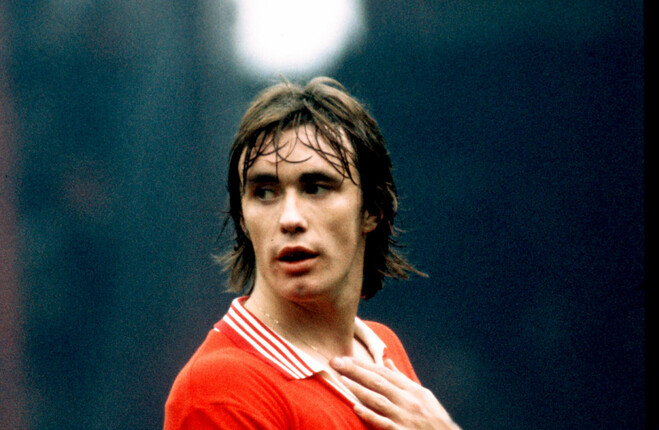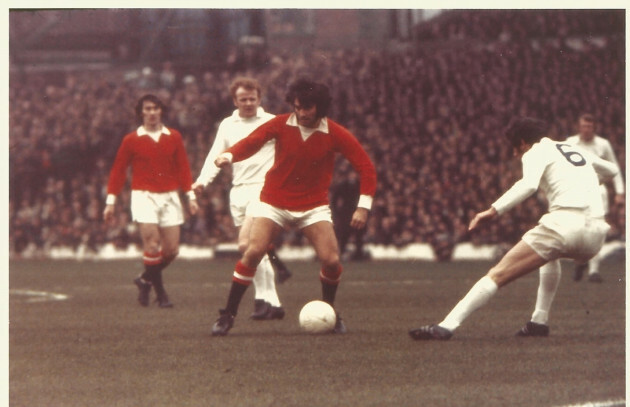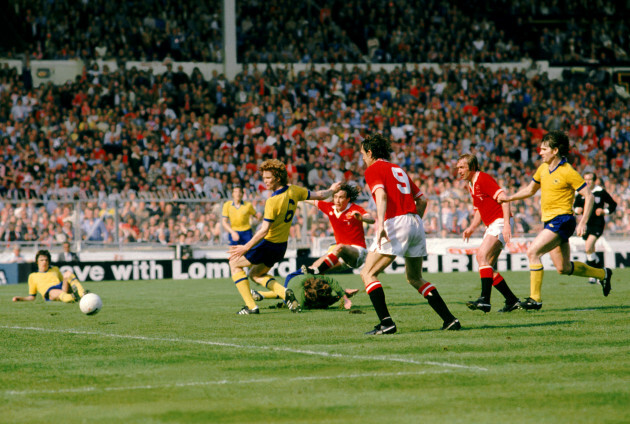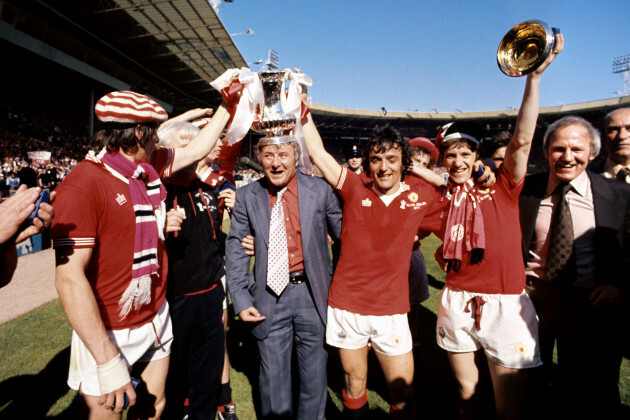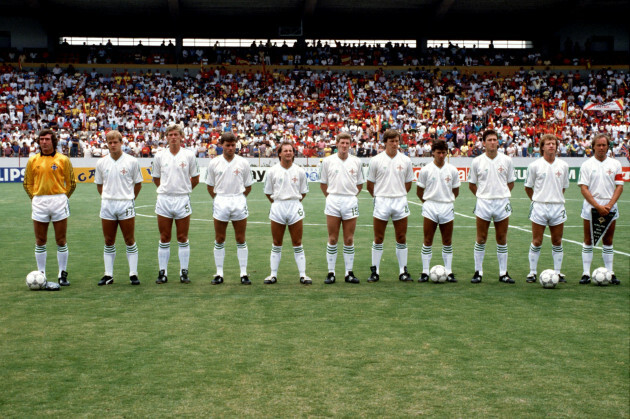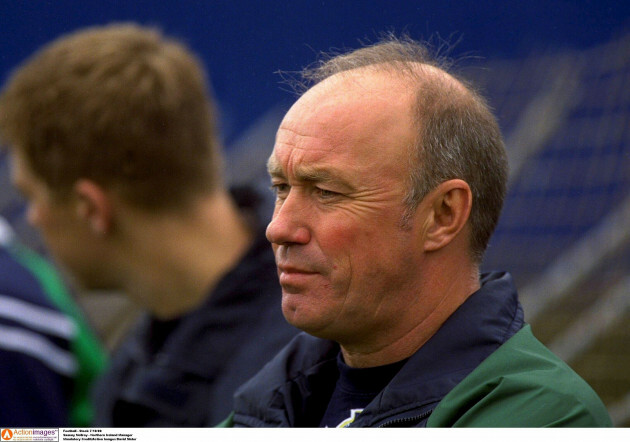FROM MAKING over 300 appearances for Manchester United, playing at two World Cups and managing his country, Sammy McIlroy has had quite a career.
It was his background in Belfast that helped shape his destiny.
McIlroy grew up amid a turbulent time in Northern Ireland, with the Troubles having a big impact on his life, especially as he came of age in the 1960s.
It was football that offered an escape from this precarious environment.
McIlroy had loved the sport as a kid. His father had played at an amateur level, and between the age of nine and 14, he was watched by Bob Bishop, the same scout that brought George Best to Man United.
Eventually, McIlroy was handed a trial in Manchester and consequently offered a way out of his increasingly dangerous home city.
“It was shocking,” he tells The42. “I left for football in 1969. That’s when the Troubles were starting and they were really bad. I was worried sick about my mother and father. We hadn’t any telephones or anything so I could keep in contact with them. There was a lady down the street facing us, Mrs Matthews — she was the only one in the area that had a house phone.
“I would get my mum down there and [she would] say exactly what was going on. Many times I phoned her, and she was in tears about how the Troubles were really [intensifying]. People knocking on the door to ask my father to do vigilante duty and stuff like that. It was horrendous and I was worried sick about them at that time.
“There was no compromise between the two [religious groups], it was Catholics, Protestants not getting on with each other, killing each other, and it was a terrible place to be at the time, the late ’60s in Belfast, and very worrying.”
McIlroy knew that football offered an escape from the violence both for himself and his family, and he acknowledges this feeling drove him to succeed.
“Once I signed professionally in Manchester, I really had it in my mind to get my mum and dad out of there. I asked the club about getting them out of there because of how the Troubles were and to be fair, they agreed. They bought me a house and I paid them back through my wages.
“Without a doubt, I knew I needed to get my mum and dad out of there, I needed to become a footballer, I needed to become successful, especially at a club like Manchester United where you’re in the spotlight 24/7 even going back to those days. I couldn’t fail. Because if I failed, I could have gone somewhere else, I could have gone home. And that’s one thing I didn’t want to do, the way the place was at the time.”
He didn’t know it back then, but McIlroy was joining a club on the decline. With a star-studded team that included George Best, Bobby Charlton and Denis Law, they had won the European Cup the previous year, but McIlroy proved to be Matt Busby’s final signing before stepping aside.
Much like with the post-Alex Ferguson era now, the club struggled to build on the great heights they reached after the legendary manager departed.
Despite being a completely different type of player, by virtue of the fact that he was also from Belfast, McIlroy drew inevitable comparisons with Best, the player he idolised as a youngster.
“Anyone who came from Belfast at the time to sign for Manchester United was always likened to George, which was an absolute no-goer because there was only one George Best and he was my hero,” the former midfielder explains. “He was the one I looked up to and the one that got me in the frame of mind to join Manchester United. I never took anything like that seriously. I never thought one iota that I could ever be anything like him. He was a complete one-off.
“He was an absolute diamond of a man. Generous. Loved talking to the Belfast boys when they came over on trial. And it was a pleasure to be in his company. I introduced him to my mum and dad when I brought them over for a little holiday in Manchester. He made them feel so welcome, it was unbelievable. My parents were very proud and honoured after they spoke to George. He made them feel that they were going to look after me, and ‘don’t worry about him, everything will be alright’. That was brilliant, coming from George.”
McIlroy acknowledges he might not have even become a footballer had it not been for Best paving the way and showing what was possible for a young kid from Belfast.
“He did, especially in the ’60s. Me coming back from school and after watching George play, I’d get the ball out on the streets and try to emulate what George did on the football field. But I always wanted to be a footballer. My father wanted me to be a footballer. And the icing on the cake was that George didn’t live that far away from me in Belfast and he was one of the main reasons why I wanted to go to Manchester United.”
McIlroy encountered many great footballers over the course of his career, both at Manchester United and elsewhere, but he says Best was unquestionably the standout player he witnessed up close.
“A lot of people now say I’m biased because of the Belfast connection, the Northern Ireland connection and whatever, but not at all. You look at the pitches you played on in those days. You look at the players he played against, the players he played against in Europe. People around in those days, Ron Harris, Tommy Smith, Norman Hunter, John McGrath, all hard men who would kick their grandmothers. Besty bounced back up and got on with it. That shows you how brave and committed he was in those days when it was so bloody hard to control a ball on the pitch with somebody breathing down your neck like those people I’ve just talked about.”
Despite his relief at leaving behind the violence of Northern Ireland, life as a youngster in Manchester was not easy by any means.
“There were a lot of people at that time that struggled and I can understand it. When you leave a place like Belfast and arrive in Manchester, it’s a totally different city, with totally different people. And it was difficult, me being an only child as well. But United were fantastic. The homesickness boys they all knew about and they sent us home once a month to get home and ease us in that way. Every time I went home, I didn’t want to come back because I was missing my mother, especially in those days, being such a young lad. But you overcome it, you start playing games, you start meeting friends, different people and you gradually get over it and become committed to being a footballer.”
His career at Old Trafford was nearly ended prematurely when McIlroy was involved in a car crash, but fortunately, he eventually recovered to the extent that he could resume his playing career.
“I was out of the game for near enough six months. I was lucky to be alive, to be honest. I was in a coma for a long time — over a week. A punctured lung, four broken ribs, and it was so difficult to try to get back to fitness. My breathing wasn’t happening, I was struggling to run. Recovery time was longer than expected. So it was a stage in my career where I was very worried about how I was going to get through it.
“Bill Foulkes, the reserve team trainer at the time, was looking after me and trying to get me back to fitness, but it was a long haul. By that time, when I had the car crash, Frank O’Farrell had been sacked and Tommy Docherty got the job. I was lying in a hospital bed, picking up the paper and reading that the Doc is bringing this person and that person in. I’m thinking I’m in trouble here. I’m doing no good to Manchester United lying in a hospital bed. But to be fair to him, he came up and saw me in hospital and promised that he would give me a chance once I was fit.”
In 1974, the Red Devils suffered the humiliation of relegation from the top flight under Docherty, but made a swift recovery, coming back up at the first attempt, while playing the type of attractive football that the club at their best are renowned for.
McIlroy remained an important player as the club finished third in their first season back up before lifting the FA Cup the following year.
“The Doc’s days were fantastic for me,” he recalls. “Okay, we got relegated but to bounce back from the second division after that was fantastic. The football we played in that team was second to none. It was exciting. Home and away, we went out with the same mindset of how to win games by [embracing] the old Busby way, playing with wingers, and scoring goals. ‘If they get two, we’ll get three.’ That was our motto. And Tommy Docherty had brought that to the team from that second division campaign into the First Division the following season and the season after that. Those three years were absolutely fantastic.”
Under Docherty, it was the first time since Busby’s departure that Man United had looked genuinely capable of enjoying a sustained period of success.
However, fate intervened and a major controversy at the time cost the manager his job. Docherty was sacked after he made public his love affair with the wife of the club’s physiotherapist, Laurie Brown.
“At the end of the day, it was a personal matter,” says McIlroy. “But Manchester United in those days with the great Sir Matt Busby, the Edwards family [who owned the club at the time], they didn’t want any bad press or anything staining [the reputation of] the club.
“It was just a shame that Tommy Docherty fell in love with the physio’s wife and they decided that he had to go. But Tommy stayed with the woman for many years and had kids, and would it happen today? I don’t know.
“Laurie was a fantastic man I got on well with and you couldn’t really sack Laurie for doing no wrong. So, unfortunately, Tommy had to go, which was a shame, because I think that team, with a few additions after we beat Liverpool in the ’77 cup final, could have tested them in the league and gone from strength to strength.”
He continues: “After the Busby era, I played under 5-6 managers. The big target then was to do as well as Sir Matt did, which was very hard to do. But Tommy was taking it in that direction, and that didn’t happen. Dave Sexton came in — totally the opposite of Tommy Doc. Fantastic coach Dave was, and that’s no disrespect to Tommy Doc, Tommy was fantastic with man-management, and how we wanted to play. But Dave was totally different in how he wanted to fine-tune us.
“I think it just took a little bit of gloss out of us, [compared to] the way we played under the Doc. It took a little bit of that charisma away from us, the way we played. But we finished second in the league under Dave and also got to a cup final, so things could have been a little bit different with a bit of luck.”
McIlroy didn’t always see eye to eye with Sexton’s successor, Ron Atkinson, and was ultimately deemed surplus to requirements, joining Stoke City for a club-record fee of £350,000.
However, just as his Man United career was coming to a conclusion, his time with Northern Ireland at international level was approaching its peak.
McIlroy was part of the famous side that beat hosts Spain and reached the second round of the 1982 World Cup.
They would also qualify for the 1986 version of the competition in Mexico.
“For Northern Ireland to get to two World Cups is unbelievable, just over a million people in Belfast and Northern Ireland. But for us to get to two World Cups was a hell of an achievement. And to get to the second stage in ’82 was unbelievable. It wasn’t like an international setup, it was like a club setup, the camaraderie we had in the squad was brilliant. We all got on well together. It was a privilege to play for that Northern Ireland team.”
The 1986 tournament, however, was overshadowed for McIlroy by personal troubles. His mother died while he was in Mexico preparing for the tournament while his father was seriously ill at the time.
“The night before I was going to Mexico, I was going to see my mother and father. My father was dying of throat cancer. I went to see my mother and [she] said: ‘Try to keep him going with the football, try to keep him interested, try to give him something to look forward to.’
“Then I get this phone call at Mexico in Albuquerque in our training base that my mother had died of a severe heart attack, which was completely out of the blue. She had a heart attack when I was at Manchester City pre-season in the Isle of Man and she came through that. She had a couple of little scares after that and then this heart attack killed her. I was expecting my father to die from throat cancer.
“I had to leave Mexico and come home for my mum’s funeral. It was so heartbreaking for me, being the only child. We got on really well. I had to come home and the state my father was in, it was so soul-destroying. But the doctors were saying to me, please go back [to Mexico] and keep his life going as long as you can.”
He continues: “The lads in the Northern Ireland squad, I was rooming with Norman Whiteside at the time and Jimmy Nicholl was a big pal of mine. The two of them came to talk to me and tried to console me a little bit. But all the lads backed me 100%. What a decision to make, whether I went home, came back or not. They all were very good to me, going through a difficult time. We had to play a World Cup. Their support helped me want to come back and see how we could do in ’86 because I was captain at the time as well. I thought it was a fantastic honour. My mother would have wanted me back there anyway, playing football.”
He enjoyed success as a manager too, most notably with Macclesfield Town, as he helped the club earn back-to-back promotions during the 1990s, in addition to undertaking stints in charge of Northwich Victoria, Northern Ireland, Stockport County and Morecambe.
“There were some problems I had with Northern Ireland and it’s well documented with withdrawals, with preparation, with people retiring, having to start again with people who were nowhere near ready. But they gave it their all, which I admired and cherished.
“When I was at Macclesfield I had loads of offers from bigger clubs and maybe I stayed a wee bit too long at Macclesfield, I should have taken a chance elsewhere and I didn’t. But when you’re asked to manage your country, you just can’t turn that down, even though I knew that I wasn’t really ready and that’s being totally honest with you. But I was asked to do it, and I did, and I don’t regret that decision.
“I regret leaving [Northern Ireland for Stockport], the way I left. But that was a decision at the time where I should have talked to somebody like Sir Alex Ferguson who was on my CV and that’s one regret in football, not speaking to the great man for a little bit of advice.”
McIlroy has not worked in management since leaving Morecambe in 2011 and says he misses coaching now.
“I was 56 when I stopped. And I stopped too early. I know that now. I said to Wayne Barton [the ghostwriter of McIlroy’s new book] that I stopped too early and I regret that decision.
“But there are many decisions I’ve done in haste in my football career and my football life, and that was one of them.”
For McIlroy though, as is the case with so many ex-pros, nothing will ever eclipse the thrill of playing.
“Don’t get me wrong, you enjoy when you win things as a manager, of course, you do. Because you’re not just looking after yourself, you’re looking after players, supporters, the chairmen and the board of directors, and when you’re successful, everything falls into place and it’s a fantastic feeling. But I’ve always said to people, you never forget your playing days, no matter how successful you are as a manager, playing for me is the best thing in football. The more successful you are, it’s even sweeter. But to play and the camaraderie and the socialising and the banter with players, you can’t beat that.”
‘The Last Busby Babe: The Autobiography of Sammy Mcilroy with Wayne Barton is published by Pitch Publishing. More info here.
